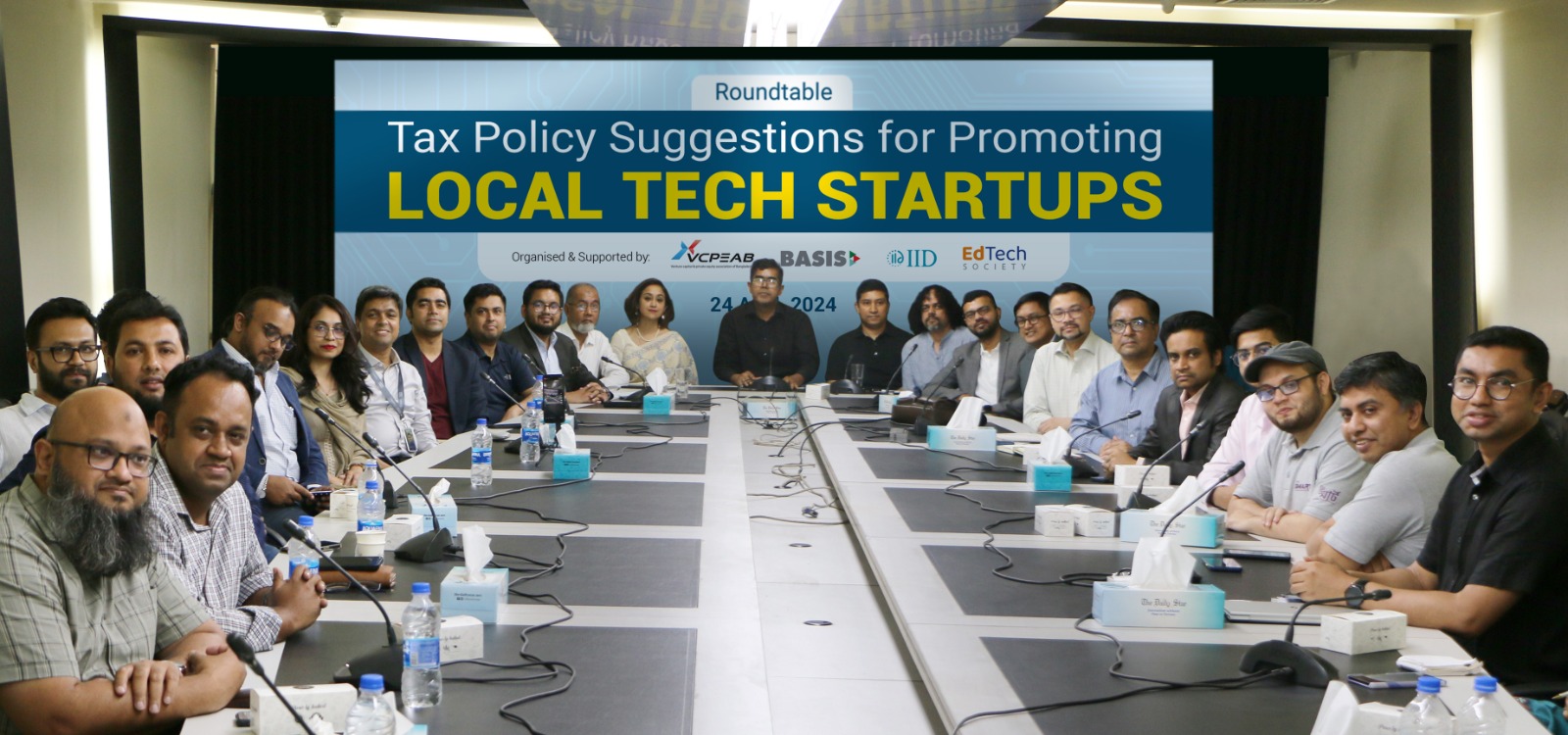
At a roundtable titled "Tax Policy Suggestions for Promoting Local Tech Startups," jointly organized by the Venture Capital and Private Equity Association of Bangladesh (VCPEAB), the Bangladesh Association of Software and Information Services (BASIS), the Institute of Informatics and Development (IID), and the EdTech Society, speakers said that the tax waiver for the software and IT-enabled services (ITES) sector, set to end this fiscal year, should be continued for the next few years to ensure the growth of the sector.
Speakers said that a premature and myopic tax regime would not only jeopardize the growth and long-term prospects of the fledgling sector but also hamstring its contribution to the economy. It will hamper the sector's competitiveness and limit its long-term ability to contribute to nation-building.
Technology entrepreneurs urged that the government should prioritize a favorable and long-term taxation policy and support the sector to achieve its full potential.
The roundtable took place on Wednesday, April 24th, in the capital's auditorium of the Daily Star and was attended by startup founders, technology entrepreneurs, and other stakeholders. Here are a few key takeaways from the roundtable:
1. Long-term Policy Thinking: Technology can become one of the most important industries for Bangladesh over the next few decades. But for the sector to grow and flourish, it will need a thoughtful long-term policy environment. In many instances, the current policy regime concerning the sector is replete with short-termism that continues to stifle its growth.
While there have been excellent initiatives and an expressed willingness on the part of the government to support the sector's growth, it needs to manifest in meaningful policy decisions that are often messy, and complex, and require genuine commitment with skin in the game.
Policymakers need to overcome short-term biases and instead look for long-term policy initiatives to help the sector grow.
2. Tax Waiver Extension Crucial: The tax waiver for the software and ITES sector, which is set to expire this fiscal year, should be extended for 5-10 more years. Industry stakeholders argue that this waiver has played an important role in boosting the competitiveness of local tech firms and fostering the growth of startups.
The entrepreneurs said if the government decides to discontinue the tax waiver for the sector, it could create existential challenges for a large number of tech startups and IT and ITES companies, which can negatively impact the future of the sector and the nation's economy.
3. Overestimation of Revenue Loss and Underestimation of Overall Impact: Tech entrepreneur and former BASIS president AKM Fahim Mashroor said the government's assessment stating that the ITES industry tax exemption costs the government Tk1,470 crore a year is unrealistic and a gross overestimation, which is also one of the motivations for why many within the government think expiring the tax waiver should increase tax collection.
Entrepreneurs suggested that if the government moves to tax startups and IT companies based on an overestimation, it will neither benefit the government nor the industry. Contrarily, it will decimate the sector's current contribution to the country's economy because many companies will find it impossible to operate with additional tax and compliance burdens.
The entrepreneurs said that the sector currently makes meaningful contributions to the nation's economy in the form of employment generation, direct income tax, and earning foreign currency. The withdrawal of meaningful support can hamper the sector's ability to grow and expand its contribution.
4. Threat to Competitiveness: Tax policy experts warned that imposing taxes on the tech sector could erode the competitiveness of local firms, especially small startups operating on tight budgets. Similarly, it can also discourage aspiring founders from starting companies and further accelerate online brain drain.
In his keynote, tax policy expert Snehasish Barua, a partner at Snehasish Mahmud and Co, said most firms are small and would lose competitiveness if tax benefits were withdrawn, as it would add to their costs for both tax payment and tax compliance.
5. Long-term Revenue Loss: Industry leaders argued that while the tax waiver might result in short-term revenue gain, the government could end up losing more revenue in the long run (5-10 years) if the sector's growth is hindered due to an unfavorable tax policy.
VCPEAB Chairman Shameem Ahsan pointed out that supportive taxation helped the sector flourish over the years, and if the waiver is withdrawn now, the government might end up losing more revenue than it would gain in the next 5-10 years.
6. Long-term Oriented Predictable Tax Policy Needed: Entrepreneurs emphasized the need for a predictable tax policy for the next 5-10 years to attract and retain investments in the sector, which heavily relies on risk capital and long-term horizons.
7. Make Policies and Processes Transparent and Easy: Participants called for tax policies and collection processes tailored to support the tech sector's growth rather than stifling it. This includes making the tax environment more startup-friendly, and making submission and compliance transparent and easier. Many entrepreneurs pointed out that the current taxation policy creates unnecessary and often detrimental compliance burdens on companies that want to stay compliant. The system remains complex, unfriendly, and littered with hidden costs that make it hard for many young companies to stay compliant and negatively affect their growth.
Overall, the roundtable highlighted the tech industry's concerns regarding the potential withdrawal of tax incentives and the need for a supportive tax policy environment to foster the growth of local startups and contribute to Bangladesh's vision of becoming a "Smart Bangladesh" by 2041.
